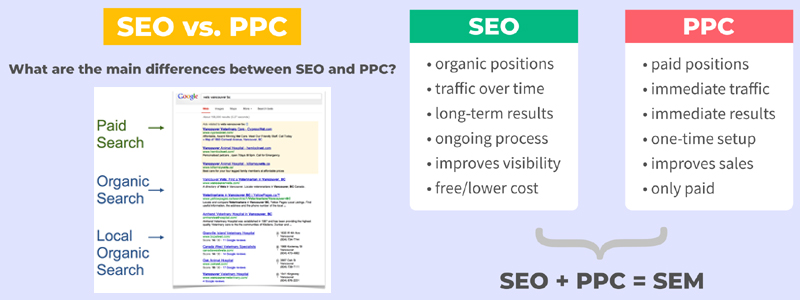There are several acronyms used in digital marketing that might be difficult to understand, such as SEO, SEM, CRM, and EDM. In this blog, we will compare SEM and SEO and explain why you should apply both if you want your website to rank higher.
Although SEO and SEM are essentially the same things, they involve completely diverse actions and are concerned with various parts of marketing. When the two terms are used interchangeably to refer to almost the same set of activities, it might be misleading for those who aren’t as well-versed in digital marketing.
So, what’s the difference between Search Engine Optimization (SEO) and Search Engine Marketing (SEM)? What is the relationship between the two and how do they collaborate?

What is SEO or Search Engine Optimization?
SEO is an important aspect of any digital marketing strategy, and regardless of what sector of digital marketing you focus on, you must have some grasp on the topic.
When it comes to search engines in the context of SEO, Google is the obvious area of focus, but Bing, Baidu, and Yahoo are all contenders. Every day, Google receives about 66,000 queries each second. That’s a lot of competition for any given firm, which is why SEO is such a vital, although difficult, aspect of digital marketing to understand.
The method by which search engines “scan” information to assess how successful it would be at attracting visitors is known as search engine optimization (SEO). Search engines evaluate a range of elements in a website (such as keywords, tags, and link headers) and rank it based on its ability to generate organic traffic.
Search engine crawlers or bots look for a variety of things. One of the major ones is quality content. The inclusion of high content signals to search engines that a website and business are offering a reputable product or service. They employ link building and keywords as part of their evaluation process. Another important factor is user experience. Websites designed to provide a seamless experience to users, websites that are simple and quick to use, or websites that help users achieve their goals easily are websites that often rank high.
Everyone can understand the fundamentals of SEO and use it to improve their digital sales, digital marketing, and content operations. And if you figure out how to do it successfully, you’ll undoubtedly attract more visitors. However, mastering the ins and outs requires time and technical expertise; for the most part, it’s a fantastic decision to hire an SEO specialist if you’re serious about increasing revenues on your website. Contact Infinity Web Experts now at 0737 326 839 and get in touch with our digital marketing and SEO experts!

What is SEM or Search Engine Marketing?
SEM (Search Engine Marketing) is a term that encompasses several different sorts of paid search advertising. This is the sort of item that is seen as a Google advertisement, and it normally appears at the top of a page list. This often involves keyword placement and usage, which is one of the reasons why executing SEM correctly might require some additional expertise and technique.
While badly executed SEM exists, when done correctly, it will catapult a website to the top of the rankings. This requires taking some time to develop the adverts so that they are effectively targeted.
SEM is excellent for establishing brand awareness since it ensures that you will appear at the top of the search results each time a search is made. It is also an excellent technique to drive targeted visitors to your site. Additionally, SEM makes it simple to assess your ROI in a straightforward manner, because it involves paid advertisements – since paid ads are employed here, it is easier to track traffic on them, as well as design campaigns based on that data.
Some examples of SEM-based digital marketing campaigns are paid/targeted ad campaigns, using highly specific keywords in copywriting and incorporating important performance metrics such as click-through rates (CTR) and pay-per-click (PPC) into prospective advertising campaigns.
The disadvantages of SEM include that it demands specialized expertise and instruments, such as Google AdSense. Those who are not familiar with the matter often require some expert guidance and employ someone who knows a lot about digital marketing and ad campaigns to take care of this side of things and make it useful. We at Infinity Web Experts offer SEM marketing strategies. Contact us now at 0737 326 839!

SEM vs SEO
The difference between SEO and SEM is minor. SEO aims to optimize the visibility of a website in search results so that it can generate more organic visitors. Search Engine Marketing (SEM), on the other hand, aims to increase traffic and exposure through both organic and paid searches. SEM works on bringing more organic and paid visitors to a site using SEO and paid techniques such as pay-per-click (PPC) advertising.
In other words, the paid search results and the organic search results are the two primary categories of Google’s search results. The purpose of SEO is to get a website to the top of the organic search results. Pay per click (PPC) – which falls under SEM – is another way to get a website into the paid section of the search results.
So in short, SEO is all about ranking high in the natural search results whereas SEM is used to attract visitors from search engines by combining SEO and PPC.
Some Similarities Between SEM And SEO
The fact that both SEO and SEM seek keywords to attract traffic to a website is a big similarity. Despite the fact that the methods for attracting visitors are significantly different, both focus on targeted traffic that may be leveraged into leads and sales. Moreover, both SEO and SEM are good for increasing brand recognition. SEO and SEM also provide a brand with the chance to boost targeted website traffic.
Should I Use SEO or SEM?
Both SEO and SEM have advantages that your company should take advantage of. In a perfect scenario, your digital marketing strategy should utilize both. Develop an SEO plan that integrates SEM for the greatest outcomes. This strategy provides your company with a diversified and complete approach to online marketing, resulting in greater traffic, leads, and sales from a variety of sources, like search, paid, and social. SEM and SEO are more effective when used together.
Having said that, there are always situations when one works more effectively than the other.
SEO should be used when:
- You should expect to see traffic, leads, and online purchases in three to six months.
- You need a digital marketing approach that isn’t reliant on a monthly ad budget.
- You (or your SEO agency) have the time and resources to handle SEO in a timely fashion.
SEM, on the other hand, should be used when:
- You need to get traffic, leads, or sales as soon as possible.
- You want to appear in high-competition search results without having to wait for SEO results.
- You have the time, money, and resources to handle your advertising on a weekly basis.
In the end, the decision between SEM and SEO comes down to what your digital marketing expectations are and how quickly you want them to be achieved.
How Much Do SEM And SEO Cost?
It’s worth noting that both SEO and SEM involve implementation expenses that have an impact on ROI. Given the number of people involved, SEO is more expensive to implement and takes longer to see results. However, owing to compounding returns, it eventually offers a significantly bigger ROI.
SEM, on the other hand, has a shorter ramp-up time, takes less lifting, and delivers income more immediately. So, if expenses over a short period of time are examined, SEM will come out on top. When the scale is stretched out to 2 years, however, SEO comes out on top.
Remember that each company’s investment will vary based on its field, objectives, and overall digital marketing plan. That isn’t to say you should disregard the findings. Rather, consider them as a guideline when putting together a budget.
How Much Time Do SEO And SEM Take To Get Results?
When it comes to how long SEO takes vs how long SEM takes, there are significant variances. SEM-based operations can create traffic practically instantaneously. SEO, on the other hand, might take months to produce significant traffic benefits.
The response time for results might be affected by a number of variables.
Considering the disparity, it is indeed crucial to prioritize your digital marketing approach carefully. SEM is the best choice if you need to swiftly generate traffic to a temporary web page for a timed event. However, if you wish to develop an enduring content hub centered on a high-value term that will provide compounding value over time, you require SEO.
Don’t know where to begin with SEM and SEO? We at Infinity Web Experts work towards SEO and SEM, and we’d love to learn more about your company. To arrange your SEO or SEM strategy, contact us immediately online or by phone at 0737 326 839!


